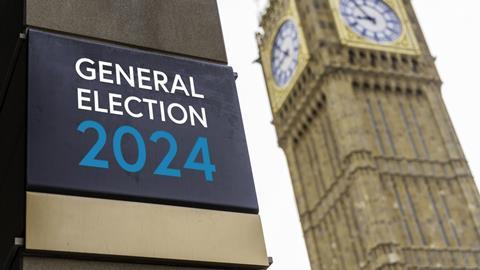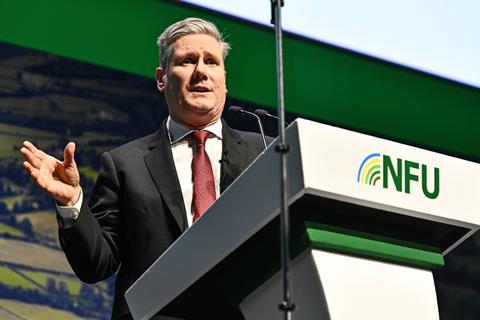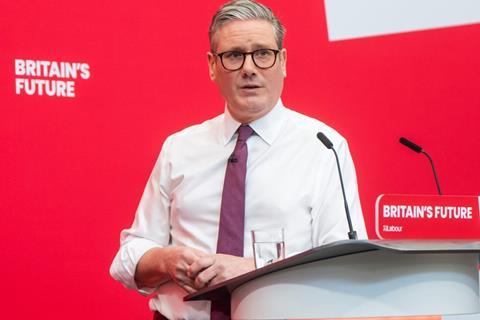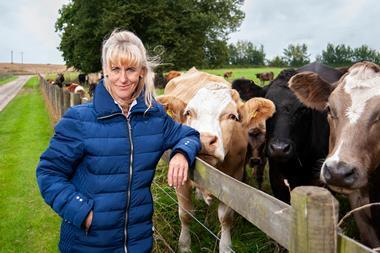After 14 years of Conservative rule, the Tories are out and the British public has elected a Labour government by a landslide.
It’s seismic, not least for the food and drink industry.
This article is being updated as more reactions come in
Association of Convenience Stores CEO, James Lowman:
“We are delighted with the response from retailers throughout the campaign, who have been eager to engage with candidates and build relationships ahead of the general election. Now that we have hundreds of new MPs, it’s crucial that we keep up the momentum so that retailers can engage with their local decision makers and highlight the work that they do in their communities.
“We look forward to engaging with the new government on the importance of local shops throughout the UK. Convenience stores are essential community hubs, creators of secure, flexible local jobs, and accelerators of local growth.”
Alliance Manchester Business School professor of marketing, Heiner Evanschitzky:
“Given the retail sector’s economic and social importance – contributing 5% of GDP, 10% of business taxes and offering over 3 million jobs - it is encouraging to see the new government signal its intent to breathe life into Britain’s high streets.
“Specifically, we welcome any efforts to introduce a new business rates regime. What “new” looks like is not yet clear, but any effective system must consider the systematic disadvantage of physical stores compared with online retailing. If the new system fails to create a level playing field, high streets will continue to decline.
“Success will also require us to explore how we can make high street shops more enjoyable spaces to visit. Our research has shown time and again that shopping is more than purchasing products; it can and should be an inspiring experience. A quick win would be to update planning restrictions to allow the flexible usage of unused space, helping to replace boarded up storefronts with pop-up stores, event spaces and hospitality offerings.”
CEO, Helen Dickinson, has reacted to Labour's victory in the general election. 🗳️
— The British Retail Consortium (@the_brc) July 5, 2024
The retail industry stands ready to work with the @UKLabour party to boost growth and investment in our economy. 📈#GE2024 #BuyIntoRetail pic.twitter.com/wThKX4an6v
Rupert Ashby, CEO, British Frozen Food Federation:
“The new government faces significant challenges relating to the food industry, including tackling the cost of living crisis, promoting healthier lifestyles and working towards vital environmental targets.
“Frozen food has a key role to play in all of these areas, but there are some key priorities that need to be addressed to maximise the impact we can have.
“These include streamlining the regulations around food packaging, modifying the plastic packaging tax (PPT) scheme and improving the processes around import and export of food, which are currently creating a large financial and administrative burden for businesses.
“We’re looking forward to collaborating with the new administration and lending our support where possible to work towards a more sustainable, healthy and prosperous UK.”

Camra chairman Nik Antona:
“Camra would like to welcome Labour as the new UK government. We look forward to working alongside them on the issues impacting consumers, pubs, social clubs and producers of beer, cider and perry. It was heartening to hear Labour’s announcement of a five-point plan to ‘end the decline of British locals’ during their election campaigning, and I hope that Labour will implement these proposals as soon as possible.
“Throughout the UK, Camra will be campaigning to see progress in improving consumer rights, pushing for the government to give consumers a right to information about drinks on the bar and the introduction of a new consumer right to a full pint. We hope the new Labour government will recognise the need for independent producers to have better access to the pub market, with is currently heavily dominated by larger corporations.
“In the run-up to the election, we heard Sir Keir Starmer and Rachel Reeves recognise the importance of beer duty to the trade. Camra will continue to fight for fairer tax with an increase in the differential between draught and off-trade duty rates, and a VAT reduction on beer and cider sold in the on-trade so consumers can continue to receive all the social and wellbeing benefits pubs offer.
“In England, Camra hopes the government will improve planning protection and enforcement to protect pubs and social clubs facing unfair demolition, and to order pubs to be built brick by brick if necessary. Camra has long called for business rates to be completely reformed in order for pubs to avoid unfair overpayments. It’s great to see that Labour is committed to changing the outdated business rates system to make it fairer between online enterprises and bricks and mortar businesses like pubs.
“We also welcome plans to introduce a genuine community right to buy, which will help many loved pubs stay open and create exciting new opportunities for the sector to thrive.”
Read more:
-
BRC calls for new government to fast-track planning reform as footfall drops
-
Election 2024: Minette Batters appointed a life peer as Labour romps to victory
-
The Grocer’s six asks of the new Labour government
City to Sea CEO, Jane Martin:
“The Labour Party has been welcomed into office with a historic majority and the weight of its manifesto commitments to fulfil, including acting on their pledge to commit to the circular economy.
“Globally there have been great strides to tackle the single-use culture drowning our planet in plastic waste; the EU has developed the PPWR, and deposit returns schemes have been implemented in a number of countries with great success.
“Simply, the UK is being left behind. Piecemeal plastic bans and a half-implemented EPR are not going to cut it. To end the array of broken pledges, Labour must mandate a UK-wide all-in deposit return scheme, set legally binding reusable packaging targets, and implement a complete ban on all unnecessary single-use plastics.
“The public are tired of dithering and empty promises. A circular economy only thrives when supported by robust policies and we welcome the opportunity to work with new MPs to fulfil the party’s manifesto commitments and tackle the plastic problem once and for all.”
Dairy UK CEO, Dr Judith Bryans:
“We’d like to extend our warmest congratulations to Sir Keir Starmer on his appointment as prime minister.
“The dairy sector is a vibrant, dynamic and important partner in ensuring food security in this country. Dairy UK stands ready to work constructively with the incoming government administration to help create healthier and sustainable future for the United Kingdom.”
Ready to go @HughFW @carolvorders #BritainDecides pic.twitter.com/aH9Ch0YVHr
— Richard Walker (@icelandrichard) July 4, 2024
Federation of Wholesale Distributors CEO, James Beilby:
“Wholesalers are the lifeblood of the nation – from supporting high street restaurants to supplying hospitals, schools and local retailers with food, the FWD membership is delivering for people across the length and breadth of the UK.
“Congratulations to Keir Starmer on being appointed prime minister of the United Kingdom after the Labour Party secured a majority in the House of Commons in yesterday’s general election.
’We’ve worked hard over the past few months to engage with the Labour team through regular meetings with roundtables with shadow food minister Daniel Zeichner, engagement with the shadow Home Office team on tackling issues such as wholesale crime and hosting Parliamentary events and site visits with shadow ministers and prospective MPs. We look forward to continuing to work with the new Labour government to ensure the wholesale sector can play a full and active role in driving future economic prosperity to every region in the UK.”
Karen Betts, CEO of the Food and Drink Federation:
“The food and drink industry is looking forward to working in active partnership with the new government as collectively we address the big challenges the food system is facing and create opportunities from them, for individuals, families, communities and our economy.
“With the right conditions, our industry can boost investment, productivity, innovation and growth across our economy. There is huge scope to improve trade too, and to grow skills everywhere throughout the country, offering more people good jobs and great careers in a sector that’s central to everyone’s everyday lives. This will improve the resilience of our sector and food security in the UK, as well as contributing to food security in other countries.
“We want to work closely with government too to move further and faster towards a more sustainable food system, which achieves net zero and protects nature, while improving our environment by driving up recycling and establishing a successful circular economy.
“And we know we have a responsibility to work actively with government and others in helping people to adopt healthier diets and lifestyles, to help improve everyone’s overall health.”
🗣️ 'Now is the time to set out a bold agenda for change; everyone deserves a food system which helps us to live well'
— The Food Foundation (@Food_Foundation) July 5, 2024
Our Executive Director Anna Taylor reacting to the @UKLabour election victory.
🔗 https://t.co/wkVkZ7PtMA#ElectionResults #GE24 #Labour pic.twitter.com/4nRpAb3dbj
Phil Stocker, CEO, National Sheep Association:
“Agriculture is still within ‘transition’ away from the Common Agricultural Policy, and in addition has suffered from several years of turmoil. With the election now over and a new Labour government in power it gives an opportunity to build on some good work that has been done, to deal with some of the gaps still left such as a clear vision and a stronger connection between food production, land management, health, and the economy, to finally give some stability and certainty to our sector – which should be seen as a strategically vital sector.
“NSA has been clear in its own priorities for a new government, however during the election period, Labour has made little reference to the farming industry. Now is the time to engage, listen and develop a food, rural, agriculture and land use policy that supports rural communities and food security in the UK. We want to start that stability with continuity with the shadow team that has engaged so far with industry. A change of personnel into these roles will not be welcomed.
“The Labour manifesto was short on detail and depth and when the party has been questioned on future agriculture budgets has responded that we need more understanding of the value and benefits of investments to date. NSA agrees with this but we are also strongly of the opinion that current budgets are inadequate given the urgency of many challenges ahead. We urgently need wider and deeper impact assessments of the new farming and environmental schemes as well as more complete recognition of public goods delivery – including food production as a public good.
“It is imperative there is not another U-turn in policy for the industry, instead existing policy needs to be built upon and fundamental issues raised by the wider industry addressed. NSA has highlighted eight priorities that the sheep industry are seeking to build a positive sector for the future, these include a commitment to increasing the agricultural budget across the nation to ensure delivery of the outcomes we want, recognition of food production as a public good, appreciation of the value of grazed livestock as a multi-functional farming and land management activity, a clear strategic policy to ensure agriculture offers viability and stability whilst giving new entrants clear support, and a commitment to reviewing carbon offsetting, biodiversity net gain, and nutrient neutrality policies.”
Tom Bradshaw, president, NFU:
“This is a reset moment for British agriculture as we work with Sir Keir Starmer’s new government to drive our sector forwards and grow.
“Labour’s manifesto recognised that food security is national security, but it is business confidence which forms the foundation of this. With British farmers and growers ambitious for the future, what they – and the public – need are practical policies that revitalise farm business confidence and deliver on our shared mission of food security.
“In a cost of living crisis, our ability to provide affordable, climate-friendly and high-welfare food will be critical for families across the country, as well as underpinning the UK’s largest manufacturing sector, food and drink, and stimulating economic growth.
“That’s why, for Britain’s farmers, the number one priority for the new Labour government must be to set an increased multi-year agriculture budget for the duration of the next parliament. This is about investing in the future of British farming – in homegrown food, in the environment and in renewable energy.
“In the coming days and weeks, we will be building on our strong engagement with Labour ministers to date to discuss essential policy solutions on key issues for our members. There are a number of policies within Labour’s manifesto which we will want to see actioned, for example ensuring the new Environmental Land Management Schemes work for all farm businesses, setting core standards for food imports and legislation to boost public procurement.
“At the same time, there are various issues that need greater recognition if the sector is to unlock its potential for growth, such as a fit for purpose seasonal workers scheme, effective import controls, supply chain fairness, investment in infrastructure and flexibility in planning.
“Our members will also want to see the new government’s commitment to food security by being alert to the risk and impact of disease, particularly bovine TB, as we work towards the government’s target to eradicate this terrible disease by 2038. With the latest science showing a 56% decline in TB outbreaks, continuing with an effective and comprehensive eradication plan, which is based on scientific evidence, is essential.
“Working together on these immediate priorities is a win-win. The public will get more of the British food they know and love, farmers and growers will have the confidence to build profitable, sustainable, resilient businesses – supporting economic growth and environmental delivery – and this new government will help to secure a safe supply of homegrown food in an increasingly volatile and uncertain world.”

Read more:
-
The four Labour power players for food and drink
-
Election: how will the parties unlock post-Brexit Britain’s potential?
-
Election: what do the parties promise when it comes to business and workers’ rights?
Jonny Player, MD, Nursery Kitchen:
“Labour has made some bold but short-sighted pledges to the education sector, failing to address a critical aspect of the early years system – food.
“Within their manifesto, they talk about driving up early years standards, but it appears these standards are focused on skills alone. How can a child enhance their skillset without having healthy, nutritious food to fuel their performance?
“What’s more, if we really want to tackle child obesity, we should be focusing on improving nutrition before primary school. Creating free breakfast clubs in schools, sadly, won’t cut the mustard. By the time a child reaches primary school, they will have already decided what they enjoy eating and changing these habits becomes exceptionally challenging.
“Parents rely on educational settings to feed their children well, so it’s shocking that there are no clear, enforceable regulations for what children eat at nursery. Nurseries across the UK have joined us in campaigning for change, and the new government has an opportunity to excel above any other previous efforts when it comes to improving child nutrition.
“Our plea is plain and simple – set clear, robust and mandatory food standards in early years settings and give children the best possible start to life.”
Chris Brook-Carter, Retail Trust:
“Retail employs more people than any other industry outside of the public sector, contributed nearly 5% to the country’s GDP last year, and plays a vital role within local high streets and communities across the country. This makes the health and happiness of the sector’s workforce fundamental both to the UK’s economic resilience and our collective sense of wellbeing.
“That’s why we’re calling on strong leadership from the new government around the big issues that are currently causing retail staff and their employers so much uncertainty and insecurity. For example, we hope that Labour’s proposals to reform business rates could start to give retailers of all shapes and sizes more confidence to plan for the future by providing some much-needed stability. The promised implementation of the new UK-wide law to make abuse of retail staff a standalone offence is also desperately needed to give staff more protection against the rising levels of abuse and violence which is threatening wellbeing across the retail industry and damaging its reputation as a great place to build or begin a career.
“Going beyond the retail sector, we’re also calling for any measures focused on encouraging those with mental health conditions back into the workforce to be accompanied by greater commitments from employers to really invest in and develop tailored wellbeing support for their people. This means employers better acknowledging and responding to their responsibilities for their staff’s mental health.
“Above all, our hope is that the government better recognises the fundamental link between happier and healthier people and the economic resilience and productivity of the UK as a whole.”
New cabinet incoming
— John Lewis & Partners (@JohnLewisRetail) July 5, 2024
Next day delivery available pic.twitter.com/fVsZaNG8Ge
Andy Slee, CEO, Society of Independent Brewers & Associates:
“The people of the UK have clearly spoken for the need for change. SIBA stands ready, and looks forward to working with the new government in Westminster and across the UK, in helping independent brewers be a part of their plans for sustainable economic growth.
“Independent breweries are a hugely valued force for good in local communities and right now, more than ever, need support to compete against the global beer giants that control the market, as well a tax system which sets a level playing field for pub and brewing businesses to grow.”
Soil Association CEO Helen Browning:
“We congratulate the new Prime Minister, Keir Starmer, and look forward to working with him and his new government. Their campaign manifesto made clear their desire to improve access to nature, promote biodiversity, decarbonise the energy system, and protect our landscapes and wildlife while supporting farmers to shift to more sustainable and nature-friendly farming practices.
“Labour have said they will give new powers to regulators and introduce a land-use framework. They have pledged to improve public health and ensure half of all public sector food is produced locally or to higher environmental standards.
“We urge that these commitments are now transformed into action. As a priority, Starmer’s government should develop an economic framework that allows money to be generated from penalising the bad things through ‘polluter pays’, and ensure that those on low incomes can access healthy and sustainable diets, with farmers supported on a journey towards cleaner, greener agriculture.
“The Soil Association champions the work and commitment of organic and agroecological farmers and growers, ethical food businesses, public sector caterers and communities across the UK. We look forward to working with the new government to build a healthier food and farming system – one that works for people and planet.”
Paul Nieduszynski, CEO, Sysco GB:
”We’re looking forward to working constructively with the new government on a range of issues. As a business and as a sector, we hope to assist government in developing a versatile skills and growth levy so we can utilise the funds not only for apprenticeships, but for a broad spectrum of training initiatives, allowing us to provide the best possible development pathways for our employees. With the need for greater sustainability across the industry, we’re keen to work with the government and looks forward to greater clarity as we accelerate the adoption of electric vehicles and hydrogen-powered technologies.”
John Kinney, MD, Unitas Wholesale:
“The Labour manifesto contained a few challenges for the wholesale channel, including minimum wage increases, a ban on the sale of energy drinks to under-16s, banning fast food outlets near schools, and the prospect of controls on HFSS products and ultra-processed foods.
“Independent wholesalers’ ask of this brand new administration is that it listens to those of us who can help turn these pledges into effective measures that achieve their stated aims.
“While we support the intention to establish better pay for the least well-off workers, affordable healthier food options for children and meaningful sustainability targets, our challenge for the new government is to lay out a legislative programme that is effective, practical and proportionate. The delays to the deposit return schemes for drink containers demonstrate what happens when government acts without sufficient consultation with stakeholders who have the experience and expertise to help shape effective legislation. In contrast, the success of the soft drinks industry levy was built on extensive collaboration, practical choices and achievable timeframes.”

Kate Nicholls, CEO, UKHospitality:
“We look forward to working with the new Labour government, which during the campaign has clearly recognised hospitality’s role serving Britain and creating places where people want to live, work and invest.
“We now need to see this followed up with action in the first 100 days. Delivering on manifesto commitments to replace business rates and reform the apprenticeship levy would be a clear sign that the Government backs hospitality as the central pillar of the everyday economy.
“Swiftly addressing business rates would fulfil a longstanding ask of the sector and avoid a cliff-edge in April, when current relief is set to end and rates are due to increase again.
“Hospitality, with its presence in every constituency, can act as a powerhouse for driving economic growth, creating new jobs and regenerating our towns and cities. I look forward to working in partnership with the new Government to help deliver its manifesto commitments and realise hospitality’s growth ambitions.”
Paddy Lillis, general secretary, Usdaw:
“In 2019, after the worst result in living memory, we could only have dreamt of Labour winning a landslide election victory. Keir Starmer changed Labour to give voters the confidence to support the party, now Labour must change Britain to secure the changes our members and all workers desperately need.
“After years of Tory chaos and attacks on workers’ rights, Labour’s plans to make work pay include transformative policies to turn the minimum wage into a genuine living wage, remove discriminatory age bands and deliver new rights to make work more secure.
“The Tories’ dither and delay on retail crime left thousands of shopworkers needlessly suffering physical and mental injury. We look forward to Labour delivering a much-needed protection of shopworkers’ law; ending the perverse £200 threshold for prosecuting shoplifters, which effectively became an open invitation to retail criminals; and funding more uniformed officers patrolling shopping areas along with town centre banning orders for repeat offenders.
“The scale of the challenge the retail industry faces is huge. With very high numbers of job losses and store closures that are scarring our high streets and communities, there are substantial issues that need to be addressed. Retailers have joined Usdaw in welcoming Labour’s comprehensive plan to help the industry, including action on business rates and support for our struggling high streets.
“Usdaw has campaigned hard for a Labour government, not just to get rid of the discredited and chaotic Tories, but to turn the country around and get our economy back on track. The election is over, the Labour victory has been achieved, now it is time to get on with the job of delivery.”
Read more:
-
Brexit ‘isn’t working’ for business, says British Chambers of Commerce boss
-
Food & drink manufacturing should be a political priority
-
Dimbleby: Election offers the chance for real food system change
Miles Beale, CEO, Wine & Spirit Trade Association:
“We are looking forward to working with a new administration that has rightly called for closer partnership between business and government to deliver economic growth. It feels like a fresh chapter and a chance to move away from the increasingly disconnected and heavy-handed approach of the previous government towards a closer and more collaborative working partnership with Labour.
“Labour has pledged to support business with a stable policy environment and an approach to business taxation that allows long-term planning. We agree and are calling on new ministers to stick to these principles for the lifetime of the new parliament – starting with making permanent the temporary easement for wine duty and delaying the extended producer responsibility scheme to ensure it is fit for purpose. The new government needs to demonstrate quickly its commitment to deliver the stability that they have promised for business by answering calls from our industry for support, partnership and clarity.
“As a trade body, we are here to help facilitate achievable policy change, working hand-in-hand with a Labour government. We want to work in close partnership with ministers and government officials to deliver economic growth, improved environmental outcomes and greater social responsibility.”




















No comments yet